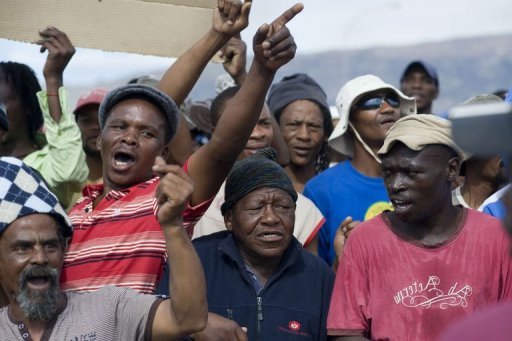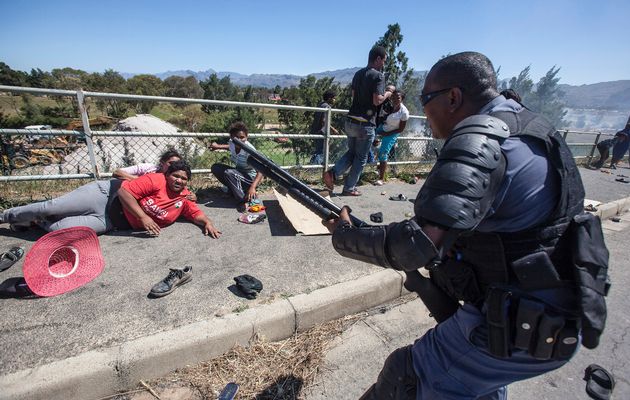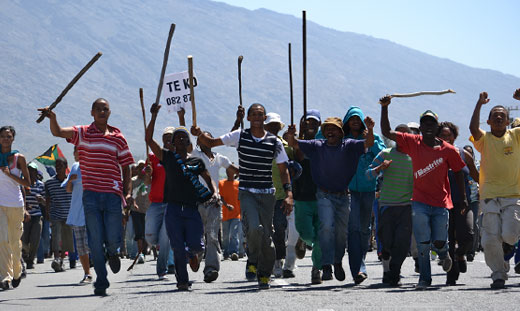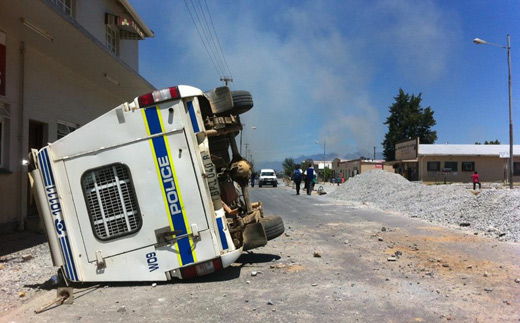Afrique du Sud : Nouvelles violences d’ouvriers agricoles, 42 arrestations
L’arrière-pays du Cap (sud) était toujours la proie vendredi de violentes manifestations d’ouvriers agricoles en grève pour leurs salaires, accompagnées de pillages et barricades, a indiqué la police qui a procédé à 42 arrestations depuis le début des troubles.

Ces violences, qui ont fait un mort mercredi dans des heurts avec la police et inquiètent les exploitants agricoles, soucieux de leur image à l’exportation, se poursuivaient dans les localités fruitières de Swellendam, Ceres, Wolseley et De Doorns.
À Swellendam, la police est intervenue vendredi matin « pour répondre aux actes de violence des manifestants qui ont pillé des magasins et perturbé l’ordre public », a indiqué le lieutenant colonel Andre Traut de la police régionale.
Au total, 42 personnes ont été arrêtées pour des faits de violence depuis le début de la grève, et trois véhicules de police ont été incendiés.
« La situation demeure tendue dans plusieurs localités, les manifestants utilisent des pneus enflammés pour bloquer les routes et se regroupent », a-t-il ajouté.
Plusieurs milliers de travailleurs agricoles réclament depuis près de deux semaines un doublement de leur rémunération à 150 rands (13,50 euros) par jour.
La plupart, métis ou noirs, gagnent entre 69 et 75 rands par jour, des salaires parmi les plus bas du pays associés à des conditions de travail et de logement souvent abusives.
Mercredi, le gouvernement a annoncé qu’il allait abroger le salaire minimum actuel et renégocier un nouveau niveau de rémunération dans les quinze jours, lançant un appel au calme, visiblement sans effet.
L’Afrique du Sud traverse une crise sociale, sans précédent depuis la fin du régime raciste de l’apartheid en 1994, dont la mine de platine de Marikana (nord) est devenue le symbole depuis que la police y a abattu 34 grévistes le 16 août.
Presse esclavagiste (Agence Faut Payer / Afriquinfos.com, 16 novembre 2012)
South Africa farmworkers defy calls to end strike
Striking South African farmworkers defied a government call to return to work Thursday and demanded action against police officers involved in the death of one of their colleagues during clashes.

Striking farmworkers march in Wolseley, a rural town north of Cape Town, on Thursday.
Police described the situation as « volatile, » with unrest reported in multiple towns and villages across the agricultural belt, not far from Cape Town.
At Wolseley, where one person was killed in clashes on Wednesday, workers rubbished government declarations that their strike was over, as they marched vowing not to go back to work until wage demands are met.
The government and union grouping COSATU earlier claimed workers had agreed to freeze the strike for two weeks while the sector’s 70 rand ($8) minimum wage is reviewed.
But protesters insisted they will not return to the fruit-growing region’s farms until they are granted a daily wage of at least 150 rand ($17).

« It’s not over for us. We are continuing no matter what. We are going forward no matter what, » said 19-year-old seasonal fruit farm worker Mandla Betshe.
« It’s just a wish for them (for it) to be over. »
Pieter Opperman, 38, who earns 80 rand a day was also adamant. « The strike is not finished, » he said.
« If we get that settlement of 150 rand, I will go back to work with all my heart. Because then I know I can put food on the table for my family and I can sort myself out. »
Amid the protests a worker delegation handed a list of demands to police that included a call for the suspension of the local police captain, after a 28-year-old man was killed in clashes.
« The most important thing is… who gave the order to shoot. Obviously someone has to take a responsibility, » said Lamie Mqungquthu, part of the worker delegation.
« Our aim today is to make peace with the police, they must leave the people because all of us have a right » to protest, he said.

A public order policeman confronts some of the protesters in Wolseley near Ceres, Western Cape, after protests turned violent and claimed the life of a resident Wednesday November 14.
Aside from demonstrations in Wolseley, police reported disturbances in the towns of De Doorns, Ceres and Swellendam.
« Police officers are deployed at all affected areas to maintain law and order, and to protect the public, » said Lieutenant Colonel Andre Traut of the Western Cape police.
Meanwhile commercial farming body Agri Wes-Cape was still tallying the impact of the strikes, which are just the latest in a wave of labour unrest that has also rocked the mining and transport sectors.
« This is the worst extreme level of worker unrest that the Western Cape has experienced, » spokeswoman Porchia Adams said.
« The mines can speak for themselves and all the other commodities but, agriculture, this is the worst one we’ve experienced, » said Adams.

Protesting farm workers march through the De Doorns town centre on 6 November 2012.
COSATU said farmworkers were merely protesting against « farmers intent on maintaining the old apartheid generational advantages. »
COSATU, which rose to prominence fighting white rule, has seen it credibility dramatically eroded during the recent bout of labour unrest, with workers repeatedly ignored leaders and accused them of being in league with big-business.
Presse esclavagiste (Justine Gerardy, Agence Faut Payer, 15 novembre 2012)
Farmworkers gather in Wolseley
About 400 farmworkers marched to the Wolseley municipal offices on Thursday morning to meet community leaders and police following unrest over wages.

This police van was upended by protesters in Wolseley on Wednesday.
A resident in the area, who did not want to be named for fear of victimisation, said he watched the protesters walk over the bridge from Pine Valley around 10.30am and gather at the building.
He said police were watching the group and that no shots had been fired or stones thrown.
Protests over wages and living conditions started in De Doorns last week and had spread to 15 other towns in the Western Cape by Wednesday.
The main road in Wolseley, Voortrekker Street, was the scene of violent protests on Wednesday. A stand-off between police and protesters resulted in the death of 28-year-old tractor driver Michael Daniels.
The Cape Times reported that Daniels had been walking past protesters to get to the shops. Farmworker Deon Conradie told the newspaper a senior police officer gave the order for officers to open fire.
“She said ‘skiet die goed vrek’ (shoot the things dead). We got frustrated with police and some protesters threw stones and swore at them,” Conradie said. He said the crowd ran when shots were fired.
The Wolseley resident who spoke to Sapa said police had warned protesters about firing live ammunition. Initially protesters attempted to negotiate with police officers.
A second group of protesters came from another direction and started throwing stones at the police, who respondeed by firing rubber bullets.
“They turned a police vehicle on its side. A farmer came down over the bridge with his pick-up truck. The same guys started throwing stones at the bakkie,” the resident said.
“The 82-year-old man, Tienie Crous, was hit in the head and arms. He’s in Ceres hospital in a stable condition and they are checking for a head injury and a broken or cracked jaw.”
A local resident helped the elderly man from his car and got him away from the crowds.
“After a while, a policeman told a resident to tell the protesters that they must please just move back and stop throwing stones because they don’t have rubber bullets.”
The group retaliated by throwing stones. Police fired a few shots to protect themselves, he said.
The latest march on Thursday followed a call by the government and the Congress of SA Trade Unions (Cosatu) on Wednesday to suspend the strike for two weeks pending a review of a bargaining council agreement.
Provincial police confirmed there was still unrest in De Doorns, Ceres and Swellendam on Thursday morning.
Cosatu organiser in the province Mike Louw said it would take some time to tell all farmworkers to suspend the strike.
He said resources were stretched, but the union federation was confident it could enforce the suspension, despite some workers’ organisations rejecting it.
Presse esclavagiste (Jenna Etheridge, Sapa / iol.co.za, 15 novembre 2012)
